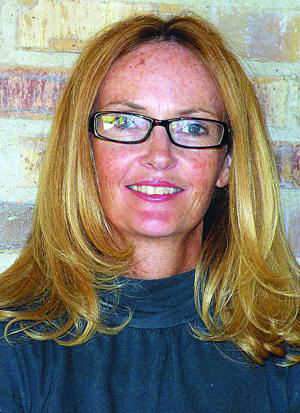By Lisa Mitchell-Bennett, Special to the Herald
When Lucia Aguilar was as young as 9 years old, she remembers being her parents’ translator and interpreter of applications, forms, school and doctor appointments. They were recent immigrants to the United States and didn’t speak English. They also hadn’t had opportunity for schooling beyond the 3rd grade.
“But they were extremely hard working, and always encouraged me to do my best and strive for better opportunities than they had,” Aguilar says.
In fact Aguilar has been successful, not only graduating from high school and college, but obtaining her Masters Degree in Social Work. She now gives back to her community by working with low-income, uninsured patients who struggle with chronic illnesses like diabetes, hypertension and depression and anxiety. She does this through an innovate program calledSalud y Vida (Health and Life), a collaboration between four clinics (Hope Clinic in McAllen, Rio Grande State Center Outpatient Clinic and SuClinica in Harlingen, and Brownsville Community Health Center in Brownsville), Proyecto Juan Diego, Tropical Texas Behavioral Health and led by the UTHealth School of Public Health. The program sends out Community Health Workers (“Promotores”) to homes of patients and provides motivation, education and group support to better manage their illness. Social Workers, like Aguilar, are key to connecting participants to needed resources, counseling, food, medication, housing assistance, transportation and other services.
“I think the fact that I had to help my parents figure things out and navigate the system, prepared me well for my career as a Social Worker,” Aguilar explains. “My childhood experiences also taught me humility and empathy, two important qualities for my current job. I know what it’s like to have to go to a food pantry, and to ask for help, despite the fact that your parents are working so hard to make ends meet. I understand the unfair start you have when you are poor, something people who grow up with resources and education don’t always understand.”
Aguilar says she often felt like a statistic growing up. “Your mom was a teen mom, you’re going to be a teen mom. Your parents didn’t finish school, so you won’t either. But I overcame expectations, and that’s the best part of my job now, helping others overcome. Sometimes it just takes someone coming alongside them at the right moment to change the trajectory of their lives for the better.”
One of Aguilar’s 76-year-old Salud y Vida participants lives in a tiny shell of a trailer. She cuts the huge lawn of her landlord in exchange for a lower rent. “She’s out there at 76 years, diabetic and hypertensive, mowing that lawn in the hot sun!”
She does other odd jobs too and during the pandemic has been even lower than usual on cash, so Aguilar arranged for some foodbank groceries to be delivered.
“She was so incredibly grateful and generous. We only brought herone bag of groceries, yet she creatively multiplied itand was able to share with a needy neighbor.”
Aguilar shares that COVID-19 has really hitparticipants in the Salud y Vida program hard. Many of them were barely hanging on before the pandemic, and because some are undocumented or were employed under the table, as contract labor or in risky frontline jobs, many of them were laid off, or have become ill or lost family members. These are folks with no health insurance and no safety net, having to make decisions between covering the rent and food for their kids or buying their diabetes medication.
“But I am inspired by people’s resiliency.When my own husband lost his job due to the pandemic, I was really inspired by theSalud y Vida participants. Many of us who have more privilege, can completely lose it when something like this happens. These folks are used to navigating hardship and while it doesn’t make it any easier for them, they tend to be more grateful and generous with what they do have.”
Agular says the biggest lesson she’s learned as a Social Worker is that we never know the future.
“Today it might be someone else, and tomorrow it could be me. Security and stability are not to be taken for granted, nor are they guaranteed. This pandemic is a prime example of that.”
Aguilar points out that another barrier her participants face when it comes to their health, is health literacy. There is often miscommunication, misconnection between clinics, doctors and patients. Oftentimes patients don’t want to ask for explanation or clarification if they don’t understand something, and many times they are embarrassed to admit that they aren’t taking their medications because they can’t read the label or can’t afford to buy it,or don’t even have reliable running water or electricity to safely maintain supplies and medication. Sometimes medical providers don’t understand the full picture.
“That’s where Salud y Vida comes in. We really try to foster that connection between healthcare providers and patients. During COVID-19 participant need has increased exponentially. Folks were struggling before the pandemic, and now are really in limbo as far as their health. Thanks to the program’s Compassion funding we can help some of them.”
Salud y Vida offers Compassion Funds, thanks to generous donors like the Valley Baptist Legacy Foundation, to help cover medications and other supplies for the uninsured in the program, so they can better control their condition and avoid landing in the emergency room or worse. There is great need here in the Rio Grande Valley, as over 50% of adults have no health insurance or coverage at all.
“I love my job because I love to play a part in helping someone overcome struggle. My parents and mentors instilled in me that just because you start somewhere doesn’t mean you have to stay there.” Aguilar is helping others achieve more health and life,because Tu Salud ¡Si Cuenta! (Your Health Matters!).





